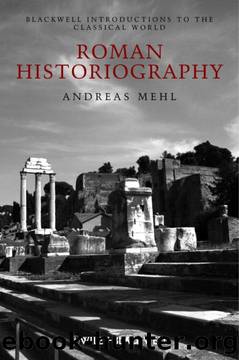Roman Historiography: An Introduction to its Basic Aspects and Development (Blackwell Introductions to the Classical World) by Andreas Mehl

Author:Andreas Mehl [Andreas Mehl]
Language: eng
Format: epub
Published: 2011-02-24T17:16:00+00:00
6.1.4 Lucius CI(audius) Cassius Dio Cocceianus
Cassius Dio was a native of Nicea in Bithynia (circa AD 155-235), and belonged to the elite of the Roman empire from the time he was born to a father who was a Roman senator, holding high offices up to and including a consulship and pro-consulship. Dio himself came early to Rome, where, like his father, he became a senator (under Commodus; 180-192), and a consul (under Septimius Severus; 193-211). Dio took part in Caracalla's (211-217) expedition to the East, and then, under Macrinus (217-218), became a curator, i.e., an imperial administrator and supervisor of finance, for the cities of Pergamum and Smyrna. Under Alexander Severus (222-235), Dio administered the provinces of Africa, and then Dalmatia and Pannonia Superior. In AD 229, he was awarded a special honor: an ordinary consulship (i.e., the eponymous consulship that gave its name to the year), which he held together with the emperor. Soon afterward he withdrew from official duties, and retired to his native city. Dio enjoyed an altogether extraordinary career that was apparently made possible by his close association with that emperor and his family who after the death of Commodus was able to win the imperial throne in the various struggles against and among his rivals. We find this mirrored in various parts of Dio's writing.
The biography Dio composed of his fellow countryman Arrian, who was likewise active historiographically, is not extant (see below, Ch. 6.4.1, p. 181). As a favor to the emperor, who was himself evidently a believer in oracles and miracles, Dio compiled oracles and omens that presented Septimius Severus' seizure of power as divinely prefigured, and he attached to it an objective account of the turmoil and battles for the imperial throne from the murder of Commodus on December 31, 192 to Septimius' entrance into Rome on June 9, 193 or perhaps beyond even this event to the defeat of his last rival for the throne in AD 197. Dio later incorporated this material in his Roman History. Dio prepared for his major work, the Romaike Historia, most likely only after 211, that is, after the death of Septimius Severus, with ten years devoted to collecting sources. He then spent another 12 years writing, bringing the work up to the death of Septimius. Dio then set the work aside, but picked it up again later, and continued it. In the end, he wrote eighty books that extended to the year of Dio's ordinary consulship in 229 (72[73].23; 80.5). Only Books 36-60 are, however, extant, covering the years 68 BC to AD 47. For the rest of the work, we must rely on the collections of excerpts compiled in the tenth century at the order of the Byzantine Emperor Constantine VII Porphyrogenitus, which were taken from ancient Greek historical accounts and arranged according to topics. Also extant are excerpts made by the Byzantine monks Joannes Xiphilinus in the eleventh century and Joannes Zonaras in the twelfth century.
Dio strove for a factual account of Roman history (46.
Download
This site does not store any files on its server. We only index and link to content provided by other sites. Please contact the content providers to delete copyright contents if any and email us, we'll remove relevant links or contents immediately.
| Archaeology | Essays |
| Historical Geography | Historical Maps |
| Historiography | Reference |
| Study & Teaching |
Underground: A Human History of the Worlds Beneath Our Feet by Will Hunt(12097)
Sapiens by Yuval Noah Harari(5370)
Navigation and Map Reading by K Andrew(5156)
The Sympathizer by Viet Thanh Nguyen(4390)
Barron's AP Biology by Goldberg M.S. Deborah T(4150)
5 Steps to a 5 AP U.S. History, 2010-2011 Edition (5 Steps to a 5 on the Advanced Placement Examinations Series) by Armstrong Stephen(3733)
Three Women by Lisa Taddeo(3433)
Water by Ian Miller(3184)
The Comedians: Drunks, Thieves, Scoundrels, and the History of American Comedy by Nesteroff Kliph(3079)
Drugs Unlimited by Mike Power(2594)
A Short History of Drunkenness by Forsyth Mark(2297)
DarkMarket by Misha Glenny(2212)
And the Band Played On by Randy Shilts(2209)
The House of Government by Slezkine Yuri(2206)
The Library Book by Susan Orlean(2069)
Revived (Cat Patrick) by Cat Patrick(1991)
The Woman Who Smashed Codes by Jason Fagone(1973)
The Absolutely True Diary of a Part-Time Indian by Sherman Alexie(1913)
Birth by Tina Cassidy(1903)
